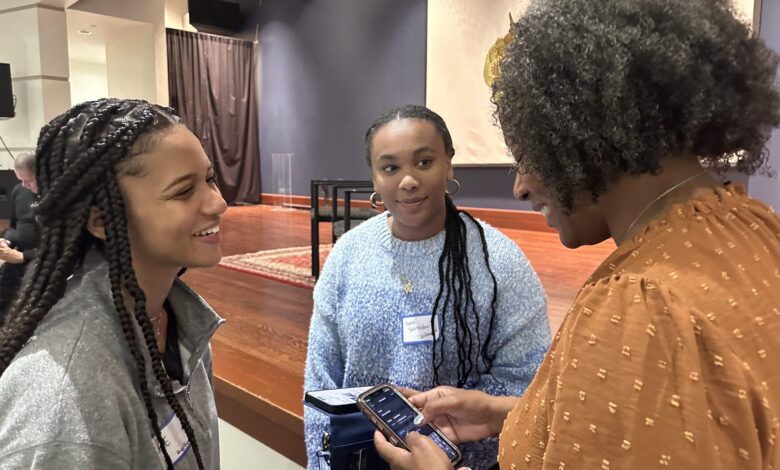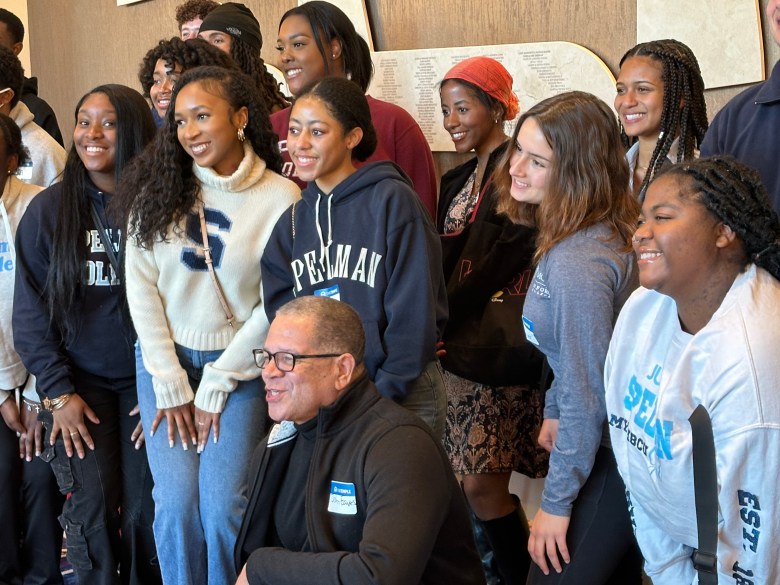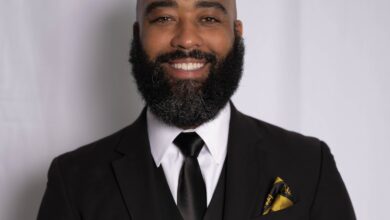Black Jewish Students and the On-Campus Divide Over Gaza – Capital B News

Life on campus at the Atlanta University Center has been more complicated for Spelman freshman Sara Scherlinder since the Gaza humanitarian crisis began more than six months ago.
In a 24-hour period earlier this month, the 19-year-old Scherlinder, a Washington, D.C., native, attended a leadership forum for students who are both Black and Jewish, which concluded just hours before an incident in which a high-ranking Biden administration official was shouted down by other AUC students who demonstrated in support of Gaza civilians facing mass killing and famine as a result of the war.
Scherlinder, who is the adopted daughter of Ashkenazi parents, is one of the few Jewish voices at the historically Black women’s college, which was founded to give Black women a place to obtain higher education without being othered. Now, she says, the intersection of political activism — long a feature of life on AUC campuses — and strong feelings about Israel’s conduct in Gaza have heightened her own awareness of her identity.
“Because I’m one of the only people here who’s Jewish, I don’t want to bring too much attention to myself,” she told Capital B Atlanta during a pair of recent interviews. “I don’t think any harm would happen to me, but … I don’t want to cause more tension.”
Scherlinder and other Black Jewish college students in Georgia, who are among an estimated 1% of American Jews who identify as Black, exist at the intersection of four cohorts — Black people, Jewish people, young adults and Georgians. Their identities, lived experiences, and views on the crisis in Gaza offer unique insight into an issue expected to play a decisive role in the upcoming presidential race.
Many Black Americans tend to find common cause with Palestinians, who advocates say have experienced a form of racial apartheid, oppression, and white supremacy at the hands of the Israeli government since the Jewish nation was established in 1948.
A majority of polled Jewish Americans (89%), in contrast, side with Israel in the conflict that erupted after the Gaza-based terrorist group Hamas attacked Israel on Oct. 7, killing 1,200 people and taking hundreds more hostage, according to a Pew Research study conducted in February.
Polls also show race and age are delineating factors in how Americans view the war in Gaza. Young Black Americans are more likely than their elders to say they’re unwilling to support President Joe Biden or Donald Trump because of the war in Gaza. And young Jews, ages 18-34, are the most likely age group to say the way Israel is carrying out the war is unacceptable (42%), Pew researchers found.
As emotions over the war run high, college students and administrators, including those at the AUC, have clashed. Last week, students at Morehouse College confronted the school’s president, David A. Thomas, over next month’s planned commencement speech by Biden, who some students accuse of enabling Israeli abuses in Gaza.
Officials at Emory University have faced calls for answers after Atlanta police and Georgia State Patrol officers were recorded using force while arresting student protestors on Thursday.
Emory sophomore Kaela Goldstein was observing the clash between pro-Palestinian and pro-Israel demonstrators on campus last week when she said police unleashed tear gas on her and other students at the scene. She said she wasn’t directly involved in the protest and eventually left the without being arrested.
“I couldn’t stop coughing and I couldn’t really see, so I left,” she said.
The 21-year-old Goldstein is a Boston native and one of the few Emory students who is both Black and Jewish. She’s described feeling torn between two sets of friends on campus, some who support Palestinians and some who support Israel.
She said she hasn’t felt unsafe at Emory since Oct. 7, despite concerns about alleged rising antisemitism.
“I feel very safe,” Goldstein said. “From my understanding, all of the people who have been openly antisemitic are those that are not affiliated with Emory University. … They’re the ones that are writing ‘Death to Israel’ and other things that promote violence and possibly antisemitism if one correlates Israel with Judaism in that sense.”
Spelman professor John Eaves, a former Fulton County Commission chairman who is Black and Jewish, faced similar backlash from pro-Palestinian AUC students when, earlier this month, he invited Uzra Zeya, the State Department’s under secretary for civilian security, democracy, and human rights, to speak to his political science class about how the Biden administration is working to increase humanitarian aid to civilians in Gaza.
The discussion, caught on video, was interrupted by students and alumni who called on Zeya to condemn the “genocide” in Gaza, where more than 34,000 civilians have been killed by Israeli forces using military aid resources supplied by the U.S. government at American taxpayers’ expense. Zeya’s office hasn’t responded to requests for comment.
Eaves said the incident upset students in his class. He also expressed concerns about rising antisemitism across the country, including some aimed at Black Jews like him.
“As a Black person, you get sort of the antisemitic-type vitriol, and some of it may come from your Black friends,” he said. “Even in terms of media attention, the focus is usually on the Ashkenazi Jews, because they’re obviously more prominent and more visible. But there’s a small group within the group that’s also impacted. Their concerns are sometimes not addressed or heard.”
Eaves is also the organizer of the annual three-day forum that Scherlinder attended. He said it was created to build bridges between the local Black and Jewish communities and advise students how to add to the legacy of Black and Jewish cooperation on civil rights.

Participating students received leadership training and learned about Atlanta’s history of Black and Jewish cooperation. This year’s event began on April 5 with Shabbat service at the Temple, the prominent Atlanta synagogue that was bombed in 1958 after senior Rabbi Jacob Rothschild voiced support for Martin Luther King Jr. and ending segregation in the Jim Crow south.
On April 6, Georgia NAACP President Gerald Griggs and Anti-Defamation League senior educator David Hoffman led a discussion on the recent increases in both antisemitism and anti-Blackness.
Participating students said they enjoyed the leadership forum. Scherlinder said she now wants to start an AUC organization for students like her who may feel marginalized.
“I am trying to, in the next year, form some sort of club that would be welcoming Jewish students in the AUC if there are any now or in the future,” she said.
This story has been updated.
Read More



